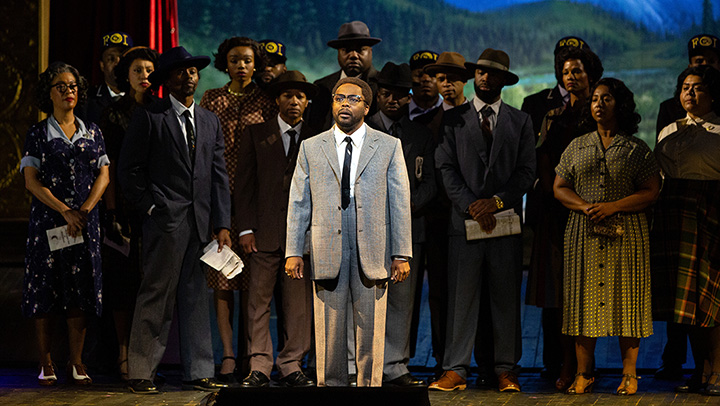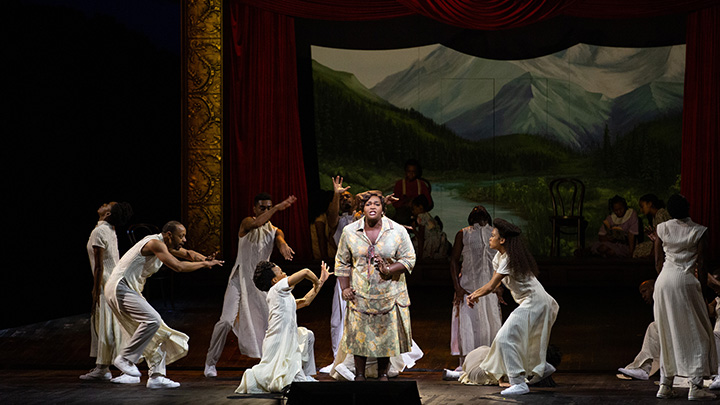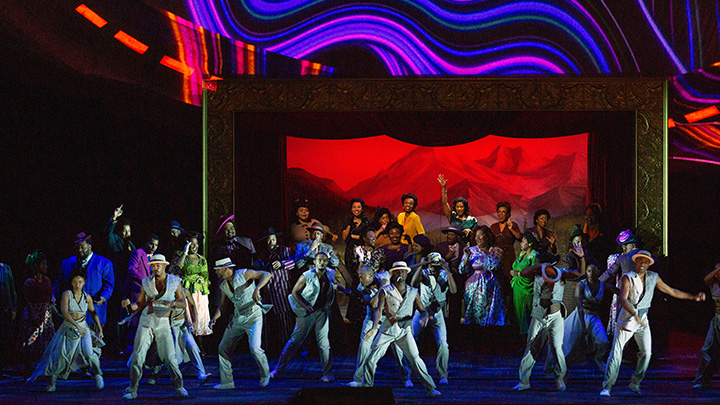Back in October 2021, baritone Will Liverman starred in Terence Blanchard’s Fire Shut Up in My Bones, based on Charles M. Blow’s memoir. Since that history-making production, the Met has put on Champion, another Blanchard opera with a bisexual baritone lead, as well as a reprise of Fire planned for April 2024, with Liverman swapped out for Ryan Speedo Greene. But that makes Anthony Davis — the composer of X: The Life and Times of Malcolm X, which made its Met debut on Friday, Nov. 3 — only the second composer of African descent to grace this storied institution.
It was heartening to see a largely Black (and young) audience on opening night — with especially stunning outfits, may I add. Satin, sequins, and suits. The opera — a family affair, with a libretto by Davis’s cousin Thulani, and story by brother Christopher — premiered at the New York City Opera more than 30 years ago.
It concerns the important civil rights figure — complex, flawed, controversial — with three acts structured around the protagonist’s name change. From Malcolm Little to Malcolm X to El-Hajj Malik El-Shabazz, bold choices on the part of the composer and Met.
The orchestra, conducted by Kazem Abdullah, was joined by Davis’s Episteme ensemble. This interaction, between concertino and ripieno reminded me of Blanchard’s jazz band in Fire and Champion. Crazed, elephant-like trumpet solos cushioned by drum set, xylophone, and piano glissandi.
Onstage, spaceship-like scaffolding took up half my field of vision. On it, clipart-like projections of flames and galloping Klan horsemen. Also, names of those killed by police: Breonna Taylor, Rodney King, Jesse Thorton. Throughout the opera, action also happened on a stage-within-a-stage with miniature Met-red velvet curtains. Many of X’s scenes featured an Afrofuturist Greek chorus, exquisitely costumed by Dede Ayite, as well as dancers in white sarong-like skirts and vests.
In Act I, Malcolm’s father is killed in streetcar accident. His mother, Louise, sung by soprano Leah Hawkins, has a mental breakdown. (In a Freudian turn, Hawkins later sung the part of Malcolm’s wife, Betty.) “Momma, help me!” sings Bryce Christian Thompson, as the young Malcolm. Four drawn-out syllables, as dancers spin the child around the stage.
Malcolm’s sister, Ella — sung by Raehann Bryce-Davis, whose comforting mezzo contrasts Hawkins’s shrillness — whisks Malcolm away to Boston. There, he meets Street — sung by tenor Victor Ryan Robertson — whose “shoot your shot” solo had everything from Broadway belting to scatting. His performance was intoxicating.
In an awkward “time lapse,” Liverman, as the grown Malcolm, appears in a turquoise Zoot suit, complete with dangling gold chain. The score sometimes had jarring transitions, too. Abrupt emotional shifts. From schmaltzy, Nat King Cole-esque orchestrations, to ritornello-like vamps. Oblique and jagged. Malcolm, under Street’s bad influence, gets arrested for burglary. “As long as I’ve been living, you’ve had your foot on me, always pressing,” he sings, in contemporary allusion to George Floyd’s murder. As he sings, “You want the truth but you don’t want to know,” the audience is illuminated, inviting self-reflection (as well as a little confusion).
Act II begins with a slow drumbeat and syncopated chorus: “In the devil’s grip, the black men mourn the slaver’s whip.” As Malcolm is in prison, his brother, Reginald — sung by bass-baritone Michael Sumuel — comes to tell him about the Nation of Islam. In a funny moment, rare in this opera, Reginald asks, “Have you met a man who knows all things?” Malcolm answers, smartly, “No brother.”
“Allah, what a strange sound,” sings Liverman. The two syllables — ah-la — lolling on his tongue. The Nation of Islam’s leader, Elijah Muhammad — also sung by Robertson, which I didn’t realize until later — is pushed out on a ladder. His tenor was like lemon cutting through Liverman’s richness.
A screen comes down with the letter “X.” “An X you must claim for what was lost,” sings the crown-wearing Elijah. “Your African name, an ocean crossed.” Indeed, the rhyming libretto felt, at times, hokey. The screen was raised and lowered a few too many times. One showed the Apollo Theater, near what is now Malcolm X Boulevard. Another showed the civil rights leader himself.
In front of this backdrop, it was apparent how little Liverman looks like Malcolm, other than the sunglasses. (I’m also estimating about a foot difference in height.) “Freedom, justice, equality,” chants Liverman, surrounded by red Nation of Islam flags. Some contemporary parallels were too close for comfort. “We are a nation trapped inside a nation,” he says in one scene. “We dream of our own land… a Black Zion.” The climax of Act II was JFK’s assassination, which Malcolm compares to “chickens coming home to roost,” a comment that angers Elijah, reflected in the glib music.
Act III opens in 5/8 meter, with globular rhythms, as the chorus sings, “Betrayal is on his lips.” Cast out by Elijah, Malcolm travels to Mecca. This location is conveyed by prayer mats, which spread over the ground, as lamps descend from the scaffolding. Projected on the “space ship,” lines from the Qu’ran in impact font. A solo cello melds with the Arabic words. Gorgeous harmonies, with a low drone in the orchestra, as a clarinet wafts above, alongside dissonant horns.
Malcolm slowly goes through motions of praying, which are new to him. Here, he becomes El-Shabazz, “A name for one reborn.” After a trip to Africa, which is not shown in the opera, he returns to Harlem. There, riots have broken out. Dancers re-enact the violence, their hands up, pleading with officers.
At a rally for the newly-formed “Organization for Afro-American Unity,” El-Shabazz’s supporters hold signs: “Police Brutality Must Go.” In his speech, El-Shabazz sings, “Settlers came, took the ground from folks yellow, black, and brown.” Despite death threats, and a house bombing, El-Shabazz takes on a speaking engagement at the Audubon Ballroom. What happens next is one of the most powerful opera endings I’ve seen. To gunshots and strobe lights, El-Shabazz freezes, and the curtains close on the podium, as shimmery violins fade into silence.
Photos: Marty Sohl






